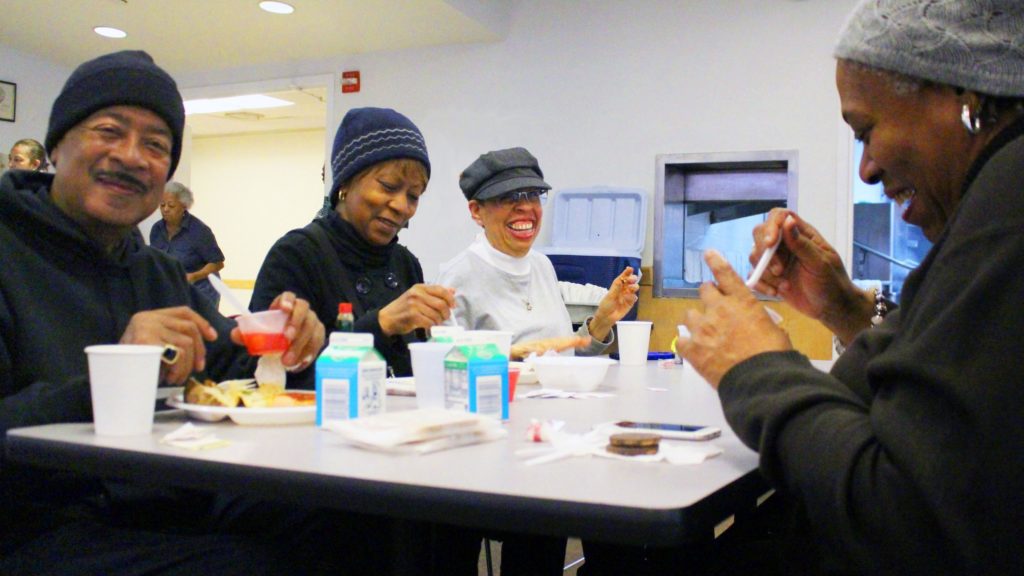
It’s a busy Tuesday morning at the Senior Center, and members begin arriving for lunch early. Today’s menu has a Latin flair—Stewed Chicken, Rice and Beans, Steamed Broccoli, and bananas—and everyone’s in the mood for a good meal and a chat at the communal dining tables.
Meals are a daily focal point of social life at the Senior Center. But they are also a crucial bulwark against hunger. A hot breakfast costs just a dollar, and lunch costs two. If you can’t afford to pay, you can still eat.
“People will come in and say, ‘It’s the end of the month and I don’t have money so I need to eat for free,'” says Senior Center Director Marcia Mason. “One man used to come and show me his Social Security statement, even though I told him he didn’t have to.”
Good nutrition is a cause Goddard Riverside takes seriously. Eating well helps the people we serve stay healthy and independent, and that in turn enables them to live their best possible lives. That’s why all of our Older Adult programs support nutrition.
According to a 2013 report by the city Department for the Aging, the median household income for older New Yorkers is about $27,500—which doesn’t go far in a high-cost city like Manhattan. Some 31% of Hispanic older adults live below the poverty line, as do 27% of their Asian counterparts and 20% of black elders. The number of older women in poverty is twice that of men.
Two hot meals a day can help stretch a fixed income significantly. And to support good nutrition, the Senior Center also offers workshops on subjects like healthy snacking, diabetes, and avoiding hypertension. In recent years it has added a salad option at lunch, which has proved to be popular.
“A lot of our members say they’re glad we have the salad bar. They’ll say ‘I lost a pound this week and my blood pressure has improved. My doctor is happy!'” Mason adds.
At Phelps House, our Older Adult residence, some people dine at the Senior Center—conveniently located in the same building—while others prefer to cook for themselves.
“We have a lot of people who are very good cooks,” says Phelps Social Services Director Rebecca Torres. “If you walk around at dinnertime you’ll smell wonderful food from all over the world.”
One challenge residents struggle with is finding affordable groceries in the area. The discount chain Food City closed a nearby store in 2013, leaving a mix of higher-end markets and bodegas. Torres and her staff help residents sign up for SNAP (commonly known as food stamps) to help cover their grocery budgets. Like the Senior Center, Phelps offers workshops on nutrition and health to help residents make good choices at the supermarket.
Nutrition is also a pressing concern up Columbus Avenue at the NORC, or Naturally Occurring Retirement Community.
“It’s not necessarily that they don’t have food. It’s more, is it the right food?” explains NORC Director Kaitlin Nelson.
NORC residents face the same difficulties finding affordable groceries, and the mobility challenges that can make shopping and cooking harder. As people age, their ability to cook for themselves can decrease—and they may not even realize it’s happening.
At the NORC’s frequent parties and gatherings, Nelson keeps a close eye on how residents interact with the refreshments.
“Some of the social occasions are when you start to figure out what’s going on,” she says. “It can be nerve-wracking watching people trying to carry their plate and their cane. Imagine cooking on your own, handling heavy pots and pans with those challenges.”
When NORC staffers see a resident struggling, they offer various kinds of support. They help people apply for SNAP, home aides and our Home Delivered Meals service. They make sure residents are aware of the Senior Center and other places to get subsidized meals. The NORC has also offered workshops on topics like how to make simple, nutritious meals in the microwave.
It can be hard to get people to accept help, though.
“There are a few different stigmas,” Nelson explains. “Some people think, ‘I don’t need assistance’ or ‘I’m not eligible.’ We also hear ‘I don’t want to take it away from someone who needs it’ or even ‘I don’t want to bother you.’ I always tell people, we’re here to be bothered! We want to help you get the support you need.”
For our neighbors who can’t come to the Senior Center or handle cooking duties at home, Home Delivered Meals provides lunch daily to more than 500 mobility-challenged older adults between 59th and 110th Streets. Program Director Karlene Clarke works closely with the Department for the Aging to plan nutritionally complete meals that supply one-third the recommended calorie level for older adults.
The food is made fresh, so the cooking staff begins arriving at six a.m. to chop vegetables and season meats. Meal recipient Nick Hazapis says the results speak for themselves.
“It’s good food. I was quite impressed by it. And it’s on the healthy side, so I’m grateful for that,” he says.
“Our chef and his staff love to cook and love to feed people,” says Clarke. “They take joy in preparing and delivering a meal people will be pl